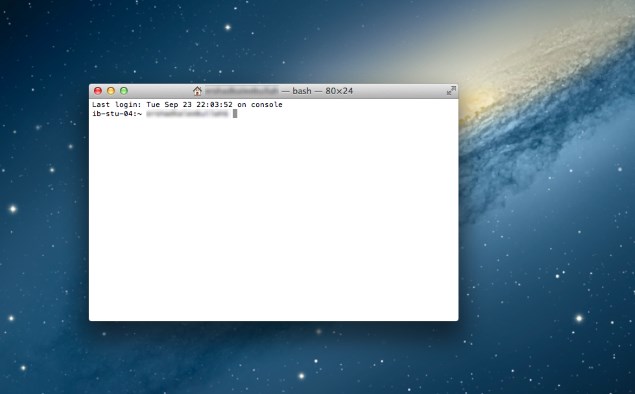- Home
- Internet
- Internet News
- 'Vast Majority of Mac Users' Not Vulnerable to Bash 'Shellshock' Exploit
'Vast Majority of Mac Users' Not Vulnerable to Bash 'Shellshock' Exploit
By NDTV Correspondent | Updated: 26 September 2014 19:57 IST

Click Here to Add Gadgets360 As A Trusted Source

Advertisement
The Shellshock vulnerability that was recently discovered in a commonly used piece of software dating back at least 20 years, apparently does not affect most users of Apple Mac computers, as earlier suggested. Although the Bash command shell is included in OS X, it is not vulnerable unless users specifically enable it. Since very few users are even aware of its presence, they will not have to take any corrective measures.
Apple enthusiast site iMore has quoted a company spokesperson as saying "Bash, a UNIX command shell and language included in OS X, has a weakness that could allow unauthorized users to remotely gain control of vulnerable systems. With OS X, systems are safe by default and not exposed to remote exploits of bash unless users configure advanced UNIX services. We are working to quickly provide a software update for our advanced UNIX users."
Users who are very familiar with Bash can patch the problem themselves, or at least disable the services until Apple releases an official fix. It was feared that users of Apple devices would be particularly at risk because OS X and iOS are both based on derivatives of UNIX, one of the oldest operating systems still widely in use.
Linux and Android have also descended from Unix, as are dozens of custom operating systems designed for appliances, embedded equipment and industrial machinery. Internet servers commonly run on Unix or Unix-based operating systems, and Bash is widely used as a remote administrative tool. These systems will also be vulnerable to Shellshock attacks unless insulated from contact via the Internet.
The Shellshock vulnerability, also called Bash Bug, could allow attackers to execute commands on computers and similar devices via the Internet. With the right tools and access, it would be possible for attackers to steal data such as passwords, and cause other kinds of mischief.
Apple enthusiast site iMore has quoted a company spokesperson as saying "Bash, a UNIX command shell and language included in OS X, has a weakness that could allow unauthorized users to remotely gain control of vulnerable systems. With OS X, systems are safe by default and not exposed to remote exploits of bash unless users configure advanced UNIX services. We are working to quickly provide a software update for our advanced UNIX users."
Users who are very familiar with Bash can patch the problem themselves, or at least disable the services until Apple releases an official fix. It was feared that users of Apple devices would be particularly at risk because OS X and iOS are both based on derivatives of UNIX, one of the oldest operating systems still widely in use.
Linux and Android have also descended from Unix, as are dozens of custom operating systems designed for appliances, embedded equipment and industrial machinery. Internet servers commonly run on Unix or Unix-based operating systems, and Bash is widely used as a remote administrative tool. These systems will also be vulnerable to Shellshock attacks unless insulated from contact via the Internet.
The Shellshock vulnerability, also called Bash Bug, could allow attackers to execute commands on computers and similar devices via the Internet. With the right tools and access, it would be possible for attackers to steal data such as passwords, and cause other kinds of mischief.
Comments
Catch the latest from the Consumer Electronics Show on Gadgets 360, at our CES 2026 hub.
Related Stories
Popular on Gadgets
- Samsung Galaxy Unpacked 2025
- ChatGPT
- Redmi Note 14 Pro+
- iPhone 16
- Apple Vision Pro
- Oneplus 12
- OnePlus Nord CE 3 Lite 5G
- iPhone 13
- Xiaomi 14 Pro
- Oppo Find N3
- Tecno Spark Go (2023)
- Realme V30
- Best Phones Under 25000
- Samsung Galaxy S24 Series
- Cryptocurrency
- iQoo 12
- Samsung Galaxy S24 Ultra
- Giottus
- Samsung Galaxy Z Flip 5
- Apple 'Scary Fast'
- Housefull 5
- GoPro Hero 12 Black Review
- Invincible Season 2
- JioGlass
- HD Ready TV
- Laptop Under 50000
- Smartwatch Under 10000
- Latest Mobile Phones
- Compare Phones
Latest Gadgets
- Honor Magic 8 RSR Porsche Design
- Honor Magic 8 Pro Air
- Infinix Note Edge
- Lava Blaze Duo 3
- Tecno Spark Go 3
- iQOO Z11 Turbo
- OPPO A6c
- Samsung Galaxy A07 5G
- Lenovo Yoga Slim 7x (2025)
- Lenovo Yoga Slim 7a
- Lenovo Idea Tab Plus
- Realme Pad 3
- Moto Watch
- Garmin Quatix 8 Pro
- Haier H5E Series
- Acerpure Nitro Z Series 100-inch QLED TV
- Asus ROG Ally
- Nintendo Switch Lite
- Haier 1.6 Ton 5 Star Inverter Split AC (HSU19G-MZAID5BN-INV)
- Haier 1.6 Ton 5 Star Inverter Split AC (HSU19G-MZAIM5BN-INV)
© Copyright Red Pixels Ventures Limited 2026. All rights reserved.






![[Sponsored] Haier C90 OLED TV | Dolby Vision IQ, 144Hz OLED and Google TV in Action](https://www.gadgets360.com/static/mobile/images/spacer.png)









